PHIL 1120 Winter 2020: Plato's Theory of Knowledge
VerifiedAdded on 2022/08/18
|6
|1615
|18
Essay
AI Summary
This essay critically examines Plato's theory of knowledge, focusing on the question of whether knowledge is as unified as he suggests. It begins by defining knowledge and outlining Plato's views, including his concept of 'justified true belief' and the doctrine of recollection. The essay delves into Plato's distinction between knowledge and opinion, and his metaphor of the sun to illustrate how humans gain true knowledge. It then explores the idea of unified knowledge, arguing that while Plato's perspective offers a philosophical foundation, the practical reality of knowledge is more complex, diverse, and not as simplified as Plato proposed. The essay incorporates references to contemporary philosophical literature to support its arguments, ultimately concluding that knowledge is not as unified as Plato suggests, though there are aspects of unification due to shared origins and goals of different discourses.
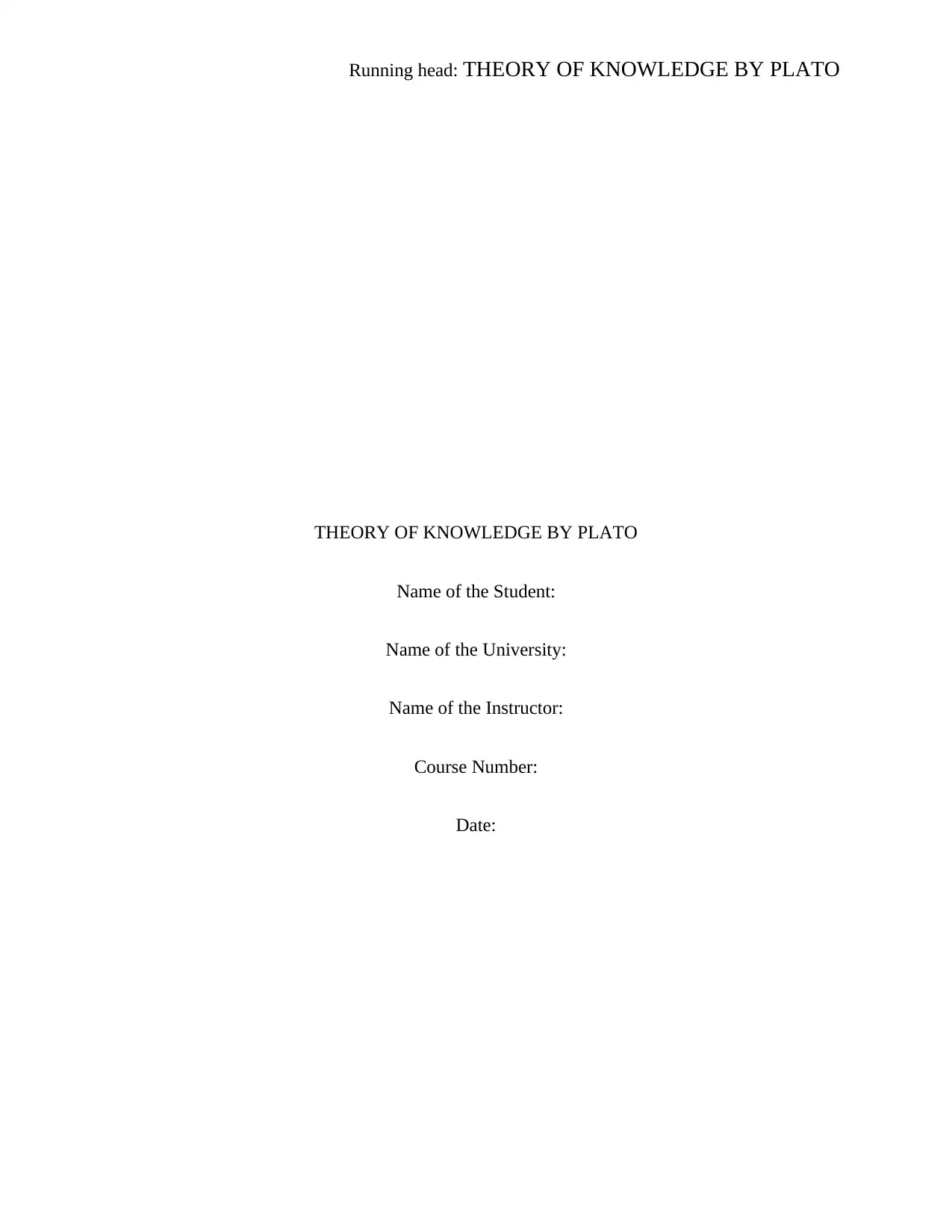
Running head: THEORY OF KNOWLEDGE BY PLATO
THEORY OF KNOWLEDGE BY PLATO
Name of the Student:
Name of the University:
Name of the Instructor:
Course Number:
Date:
THEORY OF KNOWLEDGE BY PLATO
Name of the Student:
Name of the University:
Name of the Instructor:
Course Number:
Date:
Paraphrase This Document
Need a fresh take? Get an instant paraphrase of this document with our AI Paraphraser
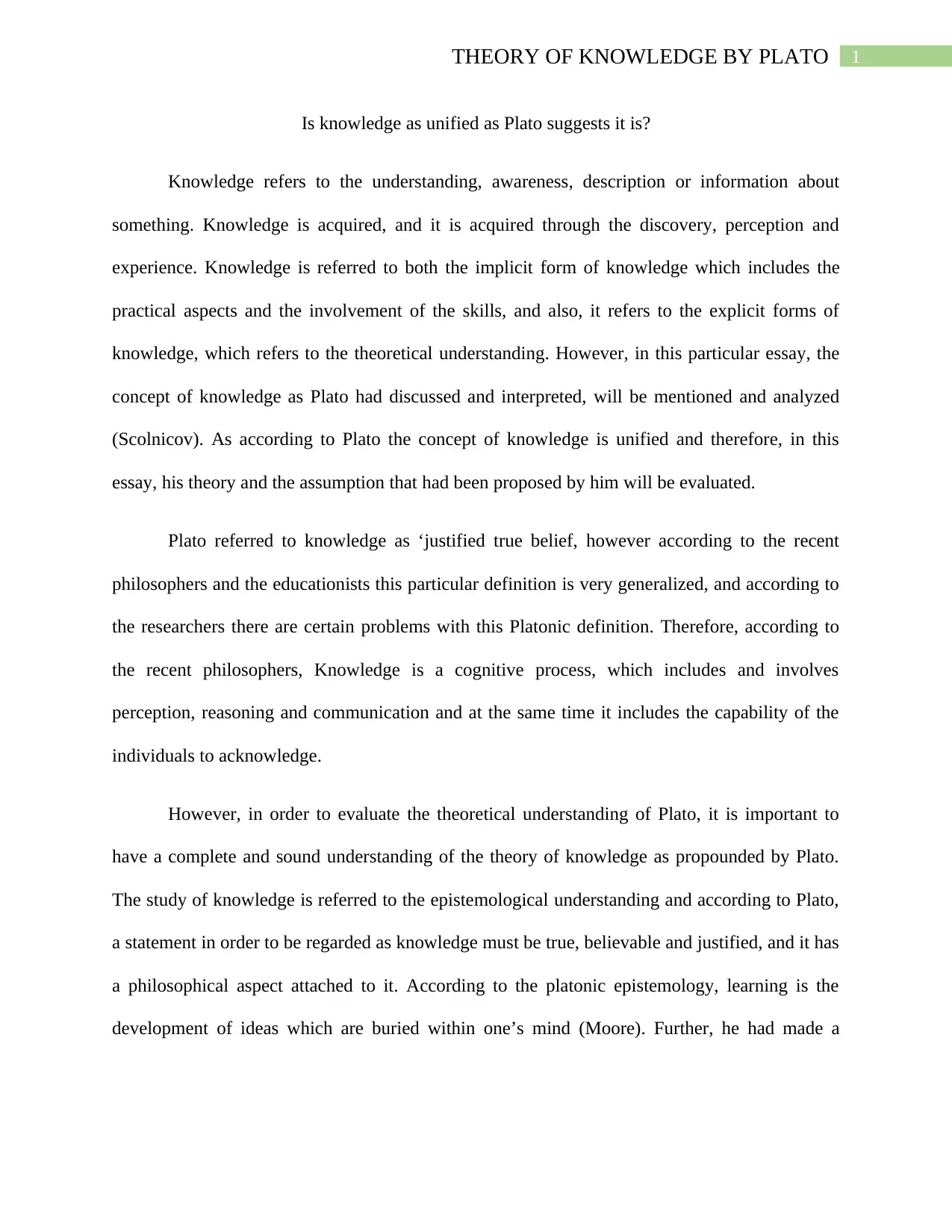
1THEORY OF KNOWLEDGE BY PLATO
Is knowledge as unified as Plato suggests it is?
Knowledge refers to the understanding, awareness, description or information about
something. Knowledge is acquired, and it is acquired through the discovery, perception and
experience. Knowledge is referred to both the implicit form of knowledge which includes the
practical aspects and the involvement of the skills, and also, it refers to the explicit forms of
knowledge, which refers to the theoretical understanding. However, in this particular essay, the
concept of knowledge as Plato had discussed and interpreted, will be mentioned and analyzed
(Scolnicov). As according to Plato the concept of knowledge is unified and therefore, in this
essay, his theory and the assumption that had been proposed by him will be evaluated.
Plato referred to knowledge as ‘justified true belief, however according to the recent
philosophers and the educationists this particular definition is very generalized, and according to
the researchers there are certain problems with this Platonic definition. Therefore, according to
the recent philosophers, Knowledge is a cognitive process, which includes and involves
perception, reasoning and communication and at the same time it includes the capability of the
individuals to acknowledge.
However, in order to evaluate the theoretical understanding of Plato, it is important to
have a complete and sound understanding of the theory of knowledge as propounded by Plato.
The study of knowledge is referred to the epistemological understanding and according to Plato,
a statement in order to be regarded as knowledge must be true, believable and justified, and it has
a philosophical aspect attached to it. According to the platonic epistemology, learning is the
development of ideas which are buried within one’s mind (Moore). Further, he had made a
Is knowledge as unified as Plato suggests it is?
Knowledge refers to the understanding, awareness, description or information about
something. Knowledge is acquired, and it is acquired through the discovery, perception and
experience. Knowledge is referred to both the implicit form of knowledge which includes the
practical aspects and the involvement of the skills, and also, it refers to the explicit forms of
knowledge, which refers to the theoretical understanding. However, in this particular essay, the
concept of knowledge as Plato had discussed and interpreted, will be mentioned and analyzed
(Scolnicov). As according to Plato the concept of knowledge is unified and therefore, in this
essay, his theory and the assumption that had been proposed by him will be evaluated.
Plato referred to knowledge as ‘justified true belief, however according to the recent
philosophers and the educationists this particular definition is very generalized, and according to
the researchers there are certain problems with this Platonic definition. Therefore, according to
the recent philosophers, Knowledge is a cognitive process, which includes and involves
perception, reasoning and communication and at the same time it includes the capability of the
individuals to acknowledge.
However, in order to evaluate the theoretical understanding of Plato, it is important to
have a complete and sound understanding of the theory of knowledge as propounded by Plato.
The study of knowledge is referred to the epistemological understanding and according to Plato,
a statement in order to be regarded as knowledge must be true, believable and justified, and it has
a philosophical aspect attached to it. According to the platonic epistemology, learning is the
development of ideas which are buried within one’s mind (Moore). Further, he had made a
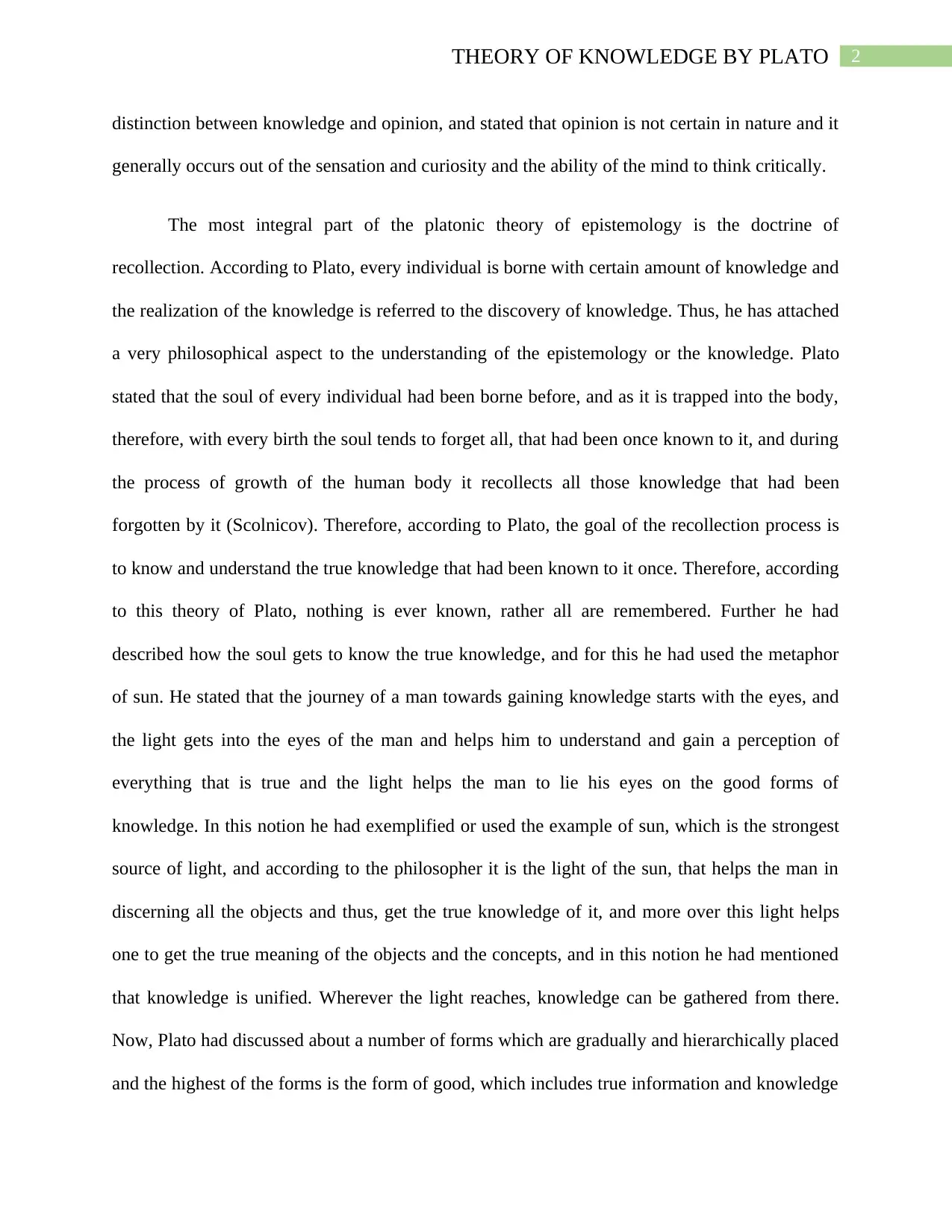
2THEORY OF KNOWLEDGE BY PLATO
distinction between knowledge and opinion, and stated that opinion is not certain in nature and it
generally occurs out of the sensation and curiosity and the ability of the mind to think critically.
The most integral part of the platonic theory of epistemology is the doctrine of
recollection. According to Plato, every individual is borne with certain amount of knowledge and
the realization of the knowledge is referred to the discovery of knowledge. Thus, he has attached
a very philosophical aspect to the understanding of the epistemology or the knowledge. Plato
stated that the soul of every individual had been borne before, and as it is trapped into the body,
therefore, with every birth the soul tends to forget all, that had been once known to it, and during
the process of growth of the human body it recollects all those knowledge that had been
forgotten by it (Scolnicov). Therefore, according to Plato, the goal of the recollection process is
to know and understand the true knowledge that had been known to it once. Therefore, according
to this theory of Plato, nothing is ever known, rather all are remembered. Further he had
described how the soul gets to know the true knowledge, and for this he had used the metaphor
of sun. He stated that the journey of a man towards gaining knowledge starts with the eyes, and
the light gets into the eyes of the man and helps him to understand and gain a perception of
everything that is true and the light helps the man to lie his eyes on the good forms of
knowledge. In this notion he had exemplified or used the example of sun, which is the strongest
source of light, and according to the philosopher it is the light of the sun, that helps the man in
discerning all the objects and thus, get the true knowledge of it, and more over this light helps
one to get the true meaning of the objects and the concepts, and in this notion he had mentioned
that knowledge is unified. Wherever the light reaches, knowledge can be gathered from there.
Now, Plato had discussed about a number of forms which are gradually and hierarchically placed
and the highest of the forms is the form of good, which includes true information and knowledge
distinction between knowledge and opinion, and stated that opinion is not certain in nature and it
generally occurs out of the sensation and curiosity and the ability of the mind to think critically.
The most integral part of the platonic theory of epistemology is the doctrine of
recollection. According to Plato, every individual is borne with certain amount of knowledge and
the realization of the knowledge is referred to the discovery of knowledge. Thus, he has attached
a very philosophical aspect to the understanding of the epistemology or the knowledge. Plato
stated that the soul of every individual had been borne before, and as it is trapped into the body,
therefore, with every birth the soul tends to forget all, that had been once known to it, and during
the process of growth of the human body it recollects all those knowledge that had been
forgotten by it (Scolnicov). Therefore, according to Plato, the goal of the recollection process is
to know and understand the true knowledge that had been known to it once. Therefore, according
to this theory of Plato, nothing is ever known, rather all are remembered. Further he had
described how the soul gets to know the true knowledge, and for this he had used the metaphor
of sun. He stated that the journey of a man towards gaining knowledge starts with the eyes, and
the light gets into the eyes of the man and helps him to understand and gain a perception of
everything that is true and the light helps the man to lie his eyes on the good forms of
knowledge. In this notion he had exemplified or used the example of sun, which is the strongest
source of light, and according to the philosopher it is the light of the sun, that helps the man in
discerning all the objects and thus, get the true knowledge of it, and more over this light helps
one to get the true meaning of the objects and the concepts, and in this notion he had mentioned
that knowledge is unified. Wherever the light reaches, knowledge can be gathered from there.
Now, Plato had discussed about a number of forms which are gradually and hierarchically placed
and the highest of the forms is the form of good, which includes true information and knowledge
⊘ This is a preview!⊘
Do you want full access?
Subscribe today to unlock all pages.

Trusted by 1+ million students worldwide
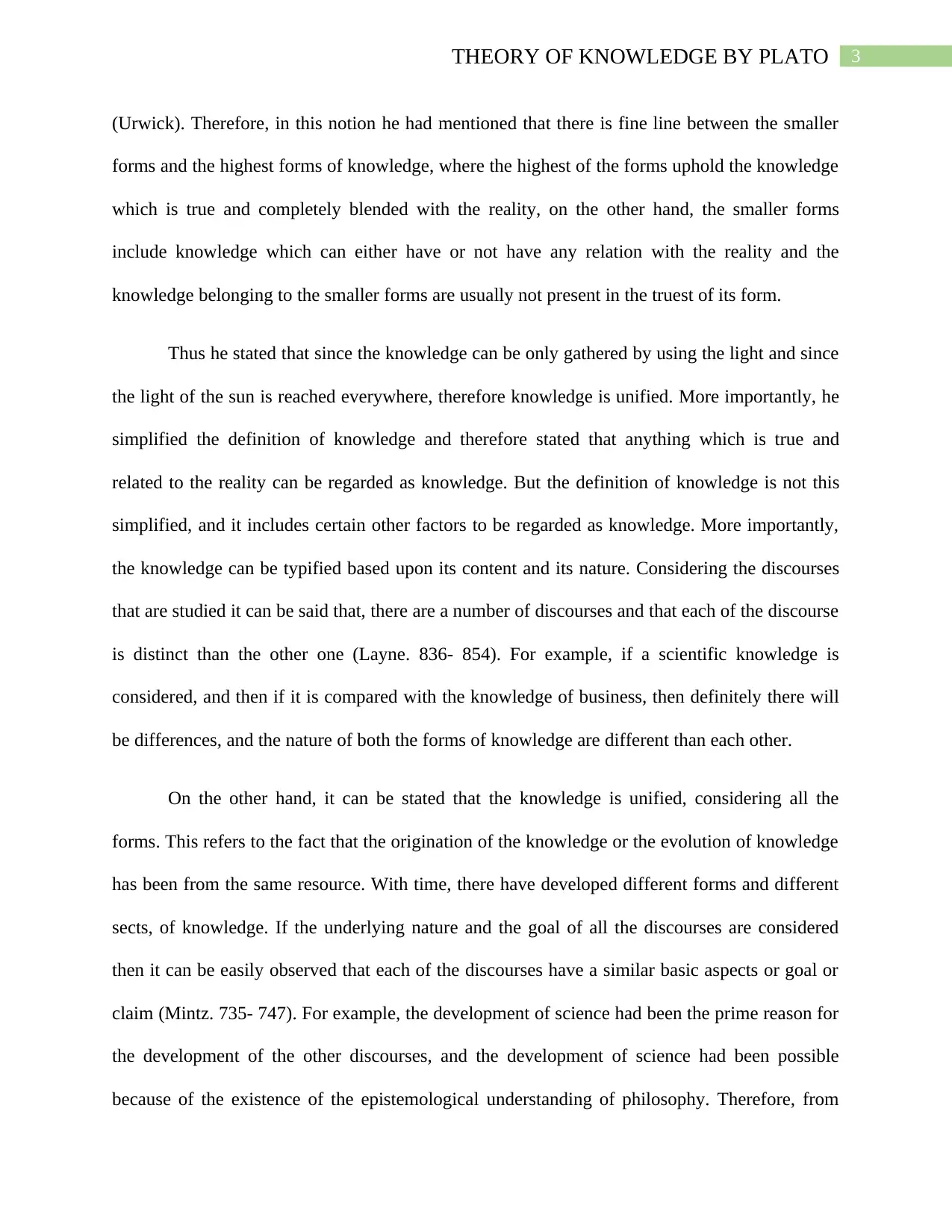
3THEORY OF KNOWLEDGE BY PLATO
(Urwick). Therefore, in this notion he had mentioned that there is fine line between the smaller
forms and the highest forms of knowledge, where the highest of the forms uphold the knowledge
which is true and completely blended with the reality, on the other hand, the smaller forms
include knowledge which can either have or not have any relation with the reality and the
knowledge belonging to the smaller forms are usually not present in the truest of its form.
Thus he stated that since the knowledge can be only gathered by using the light and since
the light of the sun is reached everywhere, therefore knowledge is unified. More importantly, he
simplified the definition of knowledge and therefore stated that anything which is true and
related to the reality can be regarded as knowledge. But the definition of knowledge is not this
simplified, and it includes certain other factors to be regarded as knowledge. More importantly,
the knowledge can be typified based upon its content and its nature. Considering the discourses
that are studied it can be said that, there are a number of discourses and that each of the discourse
is distinct than the other one (Layne. 836- 854). For example, if a scientific knowledge is
considered, and then if it is compared with the knowledge of business, then definitely there will
be differences, and the nature of both the forms of knowledge are different than each other.
On the other hand, it can be stated that the knowledge is unified, considering all the
forms. This refers to the fact that the origination of the knowledge or the evolution of knowledge
has been from the same resource. With time, there have developed different forms and different
sects, of knowledge. If the underlying nature and the goal of all the discourses are considered
then it can be easily observed that each of the discourses have a similar basic aspects or goal or
claim (Mintz. 735- 747). For example, the development of science had been the prime reason for
the development of the other discourses, and the development of science had been possible
because of the existence of the epistemological understanding of philosophy. Therefore, from
(Urwick). Therefore, in this notion he had mentioned that there is fine line between the smaller
forms and the highest forms of knowledge, where the highest of the forms uphold the knowledge
which is true and completely blended with the reality, on the other hand, the smaller forms
include knowledge which can either have or not have any relation with the reality and the
knowledge belonging to the smaller forms are usually not present in the truest of its form.
Thus he stated that since the knowledge can be only gathered by using the light and since
the light of the sun is reached everywhere, therefore knowledge is unified. More importantly, he
simplified the definition of knowledge and therefore stated that anything which is true and
related to the reality can be regarded as knowledge. But the definition of knowledge is not this
simplified, and it includes certain other factors to be regarded as knowledge. More importantly,
the knowledge can be typified based upon its content and its nature. Considering the discourses
that are studied it can be said that, there are a number of discourses and that each of the discourse
is distinct than the other one (Layne. 836- 854). For example, if a scientific knowledge is
considered, and then if it is compared with the knowledge of business, then definitely there will
be differences, and the nature of both the forms of knowledge are different than each other.
On the other hand, it can be stated that the knowledge is unified, considering all the
forms. This refers to the fact that the origination of the knowledge or the evolution of knowledge
has been from the same resource. With time, there have developed different forms and different
sects, of knowledge. If the underlying nature and the goal of all the discourses are considered
then it can be easily observed that each of the discourses have a similar basic aspects or goal or
claim (Mintz. 735- 747). For example, the development of science had been the prime reason for
the development of the other discourses, and the development of science had been possible
because of the existence of the epistemological understanding of philosophy. Therefore, from
Paraphrase This Document
Need a fresh take? Get an instant paraphrase of this document with our AI Paraphraser
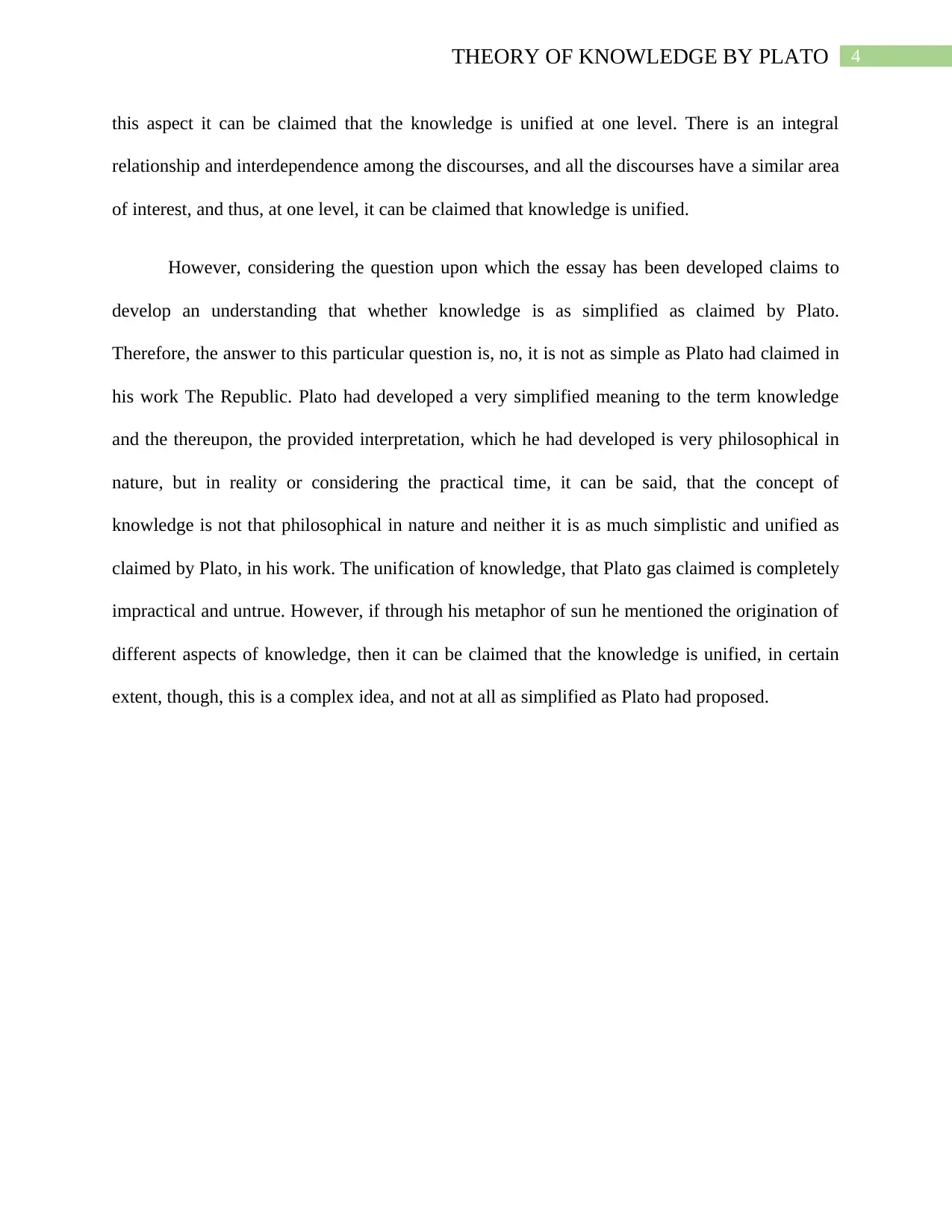
4THEORY OF KNOWLEDGE BY PLATO
this aspect it can be claimed that the knowledge is unified at one level. There is an integral
relationship and interdependence among the discourses, and all the discourses have a similar area
of interest, and thus, at one level, it can be claimed that knowledge is unified.
However, considering the question upon which the essay has been developed claims to
develop an understanding that whether knowledge is as simplified as claimed by Plato.
Therefore, the answer to this particular question is, no, it is not as simple as Plato had claimed in
his work The Republic. Plato had developed a very simplified meaning to the term knowledge
and the thereupon, the provided interpretation, which he had developed is very philosophical in
nature, but in reality or considering the practical time, it can be said, that the concept of
knowledge is not that philosophical in nature and neither it is as much simplistic and unified as
claimed by Plato, in his work. The unification of knowledge, that Plato gas claimed is completely
impractical and untrue. However, if through his metaphor of sun he mentioned the origination of
different aspects of knowledge, then it can be claimed that the knowledge is unified, in certain
extent, though, this is a complex idea, and not at all as simplified as Plato had proposed.
this aspect it can be claimed that the knowledge is unified at one level. There is an integral
relationship and interdependence among the discourses, and all the discourses have a similar area
of interest, and thus, at one level, it can be claimed that knowledge is unified.
However, considering the question upon which the essay has been developed claims to
develop an understanding that whether knowledge is as simplified as claimed by Plato.
Therefore, the answer to this particular question is, no, it is not as simple as Plato had claimed in
his work The Republic. Plato had developed a very simplified meaning to the term knowledge
and the thereupon, the provided interpretation, which he had developed is very philosophical in
nature, but in reality or considering the practical time, it can be said, that the concept of
knowledge is not that philosophical in nature and neither it is as much simplistic and unified as
claimed by Plato, in his work. The unification of knowledge, that Plato gas claimed is completely
impractical and untrue. However, if through his metaphor of sun he mentioned the origination of
different aspects of knowledge, then it can be claimed that the knowledge is unified, in certain
extent, though, this is a complex idea, and not at all as simplified as Plato had proposed.
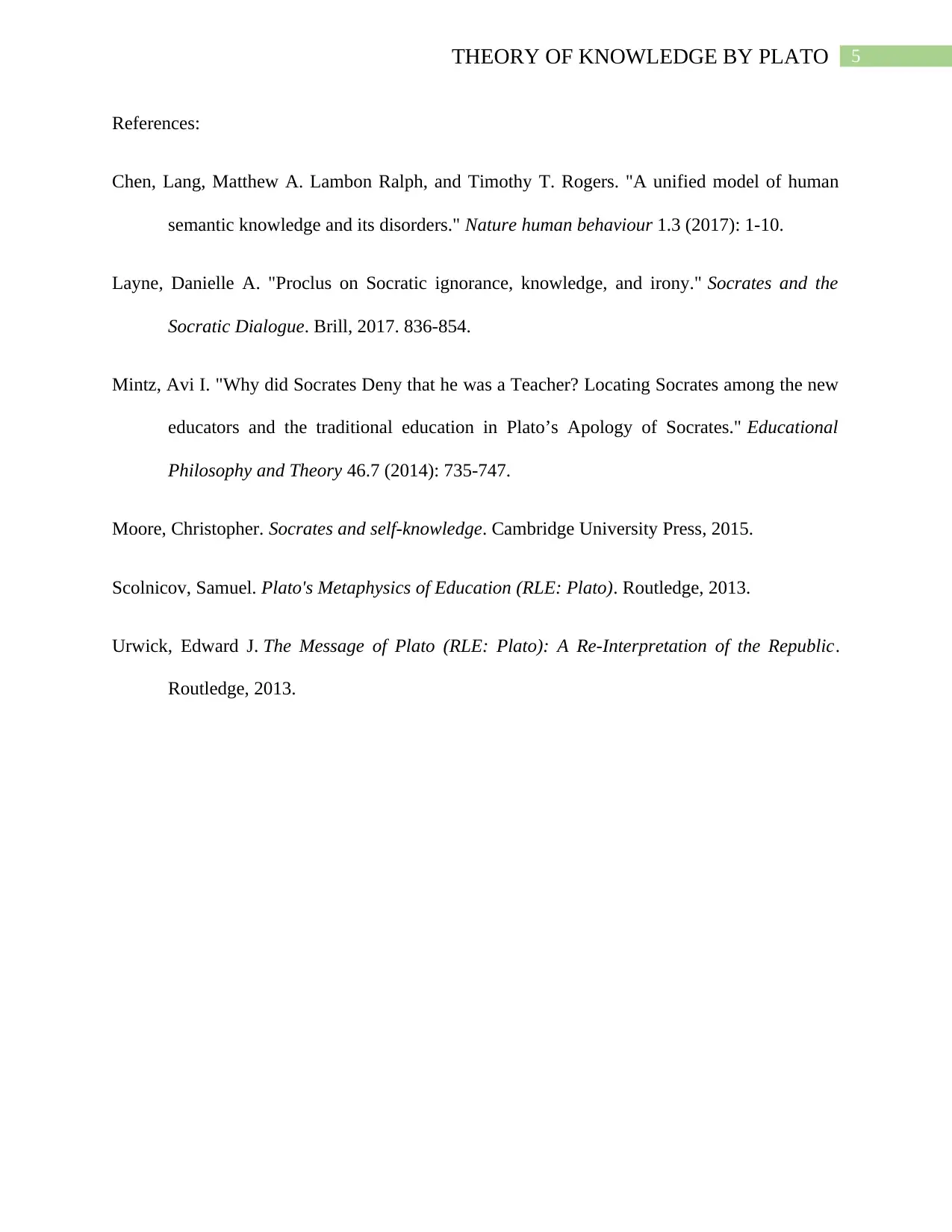
5THEORY OF KNOWLEDGE BY PLATO
References:
Chen, Lang, Matthew A. Lambon Ralph, and Timothy T. Rogers. "A unified model of human
semantic knowledge and its disorders." Nature human behaviour 1.3 (2017): 1-10.
Layne, Danielle A. "Proclus on Socratic ignorance, knowledge, and irony." Socrates and the
Socratic Dialogue. Brill, 2017. 836-854.
Mintz, Avi I. "Why did Socrates Deny that he was a Teacher? Locating Socrates among the new
educators and the traditional education in Plato’s Apology of Socrates." Educational
Philosophy and Theory 46.7 (2014): 735-747.
Moore, Christopher. Socrates and self-knowledge. Cambridge University Press, 2015.
Scolnicov, Samuel. Plato's Metaphysics of Education (RLE: Plato). Routledge, 2013.
Urwick, Edward J. The Message of Plato (RLE: Plato): A Re-Interpretation of the Republic.
Routledge, 2013.
References:
Chen, Lang, Matthew A. Lambon Ralph, and Timothy T. Rogers. "A unified model of human
semantic knowledge and its disorders." Nature human behaviour 1.3 (2017): 1-10.
Layne, Danielle A. "Proclus on Socratic ignorance, knowledge, and irony." Socrates and the
Socratic Dialogue. Brill, 2017. 836-854.
Mintz, Avi I. "Why did Socrates Deny that he was a Teacher? Locating Socrates among the new
educators and the traditional education in Plato’s Apology of Socrates." Educational
Philosophy and Theory 46.7 (2014): 735-747.
Moore, Christopher. Socrates and self-knowledge. Cambridge University Press, 2015.
Scolnicov, Samuel. Plato's Metaphysics of Education (RLE: Plato). Routledge, 2013.
Urwick, Edward J. The Message of Plato (RLE: Plato): A Re-Interpretation of the Republic.
Routledge, 2013.
⊘ This is a preview!⊘
Do you want full access?
Subscribe today to unlock all pages.

Trusted by 1+ million students worldwide
1 out of 6
Your All-in-One AI-Powered Toolkit for Academic Success.
+13062052269
info@desklib.com
Available 24*7 on WhatsApp / Email
![[object Object]](/_next/static/media/star-bottom.7253800d.svg)
Unlock your academic potential
Copyright © 2020–2025 A2Z Services. All Rights Reserved. Developed and managed by ZUCOL.


